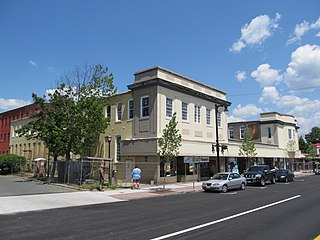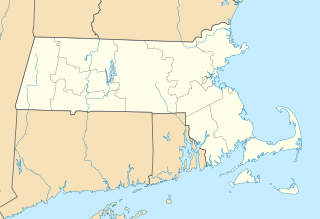
The Cheney Brothers Historic District was a center of the silk industry in Manchester, Connecticut, in the late 19th and early 20th century. The 175-acre (71 ha) district in includes over 275 mill buildings, workers houses, churches, schools and Cheney family mansions. These structures represent the well-preserved company town of the Cheney Brothers silk manufacturing company, the first America-based silk company to properly raise and process silkworms, and to develop the difficult techniques of spinning and weaving silk. The area was declared a National Historic Landmark in 1978.

The Crescent Brass and Pin Company Building is located at 5766 Trumbull Street in Detroit, Michigan. It was listed on the National Register of Historic Places in 2003. It is currently known as the Research Lofts on Trumbull.

The Dorchester-Milton Lower Mills Industrial District is a historic district on both sides of the Neponset River in the Dorchester area of Boston and in the town of Milton, Massachusetts. It encompasses an industrial factory complex, most of which was historically associated with the Walter Baker & Company, the first major maker of chocolate products in the United States. The industrial buildings of the district were built between about 1868 and 1947, and were listed on the National Register of Historic Places in 1980, with a slight enlargement in 2001.

The Bigelow Carpet Company Woolen Mills are a historic mill complex on Main Street in Clinton, Massachusetts. The sprawling mill complex was built or expanded by the Bigelow Carpet Company, one of Clinton's leading business for much of the 19th and early 20th centuries. The complex was listed on the National Register of Historic Places in 1983. It continues to be adaptivelry reused by smaller businesses.

The Wellington Piano Case Company Building is an historic building at 54 Green Street in Leominster, Massachusetts. The four-story brick building was built in 1895 by Frank E. Wellington, who manufactured piano cases for upright and grand pianos. The building was listed on the National Register of Historic Places in 1984. It was converted to condominium residences in 2002.

The Wachusett Shirt Company is an historic industrial complex at 97-106 Water Street in Leominster, Massachusetts, United States. The five-building complex was developed between 1887 and 1910, and was home to one of the city's leading employers until the 1930s. Most of the complex converted into a residential complex known as Riverway Apartments in 1981. It was listed on the National Register of Historic Places in 1982.

Cluett Peabody & Company, Inc. once headquartered in Troy, New York, was a longtime manufacturer of shirts, detachable shirt cuffs and collars, and related apparel. It is best known for its Arrow brand collars and shirts and the related Arrow Collar Man advertisements (1905–1931). It dates, with a different name, from the mid-19th century and was absorbed by Westpoint Pepperell in the 1980s. The Arrow name is still licensed to brand men's shirts and ties.

The United States Whip Company Complex or "United States Line Company Complex" is a historic factory located in Westfield, Massachusetts. It was owned and operated by one of the whip-making businesses that led Westfield to become widely known as "Whip City". United States Whip, created in 1892 by the consolidation of several local manufacturers, was the world's largest manufacturer of whips. The factory complex was listed individually on the National Register of Historic Places in 1983, and as part of an expanded Westfield Center Historic District in 2013.

The F. A. Whitney Carriage Company Complex Historic District encompasses a major 19th-century industrial complex off 124 Water Street in Leominster, Massachusetts. The complex is one of the best-preserved in the city, and was developed by of its most successful businesses of the late 19th and early 20th centuries. The F. A. Whitney Company, founded in 1858, manufactured baby carriages and related products, and operated here from 1862 to 1952, and was one of the city's major employers. The oldest surviving buildings of its manufacturing complex date to 1872. The district was listed on the National Register of Historic Places in 1988. Most of the complex has been converted into residential use.

The Whitney & Company building is a historic industrial facility in Leominster, Massachusetts. The utilitarian brick four story building was built in 1893, and extended in 1923. It was built by Fred Abbot Whitney and Walther F. Whitney, whose business was the manufacture of boxes, notably paper boxes and satin-lined boxes, used for shipping other products to customers. The site was listed on the National Register of Historic Places in 1989. It has since been converted into residences called the Watermill Apartments.

The Mill Village Historic District is a historic district encompassing a well-preserved 19th century mill village in Williamstown, Massachusetts. It is located on Cole Avenue and other streets east of Cole and south of the Hoosac River, which provided the mill's power. The complex dates to the mid-19th century, and includes tenement houses, housing for supervisors and specialty personnel, as well as a surviving mill building. The village district was listed on the National Register of Historic Places in 1983.

Adams is a former train station at 10 Pleasant Street in Adams, Massachusetts. Built in 1899, it served as the town's principal rail station on the North Adams Branch of the Boston and Albany Railroad until the mid-20th century. The surviving buildings were listed on the National Register of Historic Places in 1982 as the Pittsfield & North Adams Passenger Station and Baggage & Express House. The former station is currently the home of a sports bar and restaurant.

The Southbridge-Sargent Manufacturing District encompasses a collection of three 19th-century factory buildings near a historically important railroad junction in southern Worcester, Massachusetts. They were built near the intersection of Sargent and Gold Streets, just south of Southbridge Street. The location is close to a junction of three major railroads: the Boston and Albany, the Norwich and Worcester, and the New York, New Haven, and Hartford. The area was once a major industrial part of the city, but has lost many of its historic factory buildings in the 20th century.

The Cable Piano Company was an American manufacturer of pianos and reed organs that operated independently from 1880 to 1936. It claimed to be "the world's greatest manufacturer of pianos, inner player pianos, and organs"; in its early 1900s heyday, it was indubitably one of the largest.

The Sanford Whip Company is a historic factory located at 330 Elm Street in Westfield, Massachusetts. Built in 1883, it was owned and operated by one of the whip-making business that led Westfield to become widely known as "Whip City". The building for many years housed a novelty toy manufacturer after the market for whips declined in the early decades of the 20th century. The factory was listed individually on the National Register of Historic Places in 2008, and as part of an expanded Westfield Center Historic District in 2013. It has been converted into affordable housing space.

The Kimball Brothers Shoe Factory is a historic factory building at 335 Cypress Street in Manchester, New Hampshire. The four-story brick building was built in stages between 1885 and 1900, and was a prototypical structure from which the design of other period shoe factories in Manchester were built. Construction was overseen by Head & Dowst, a builder responsible for a number of area public buildings, including schools and prisons. It was funded by local businessmen seeking to diversify the local economy, and was leased to the Kimball Brothers, a leading shoe manufacturer in Lynn, Massachusetts. The building was listed on the National Register of Historic Places in 1985.

The Queensbury Mill is a historic mill building at 1 Market Street in Somersworth, New Hampshire. Built in 1884, it is unusual for the period for its wood-frame construction, and for its financing, executed by local businessmen to attract shoe manufacturers to the city. The mill was listed on the National Register of Historic Places in 1987. The building has been converted into apartments.

The Nashua Gummed and Coated Paper Company Historic District encompasses a collection of former industrial buildings on the north side of the Nashua River in Nashua, New Hampshire. Located on Franklin and Front Streets west of Main Street, the complex was developed by the Nashua Gummed and Coated Paper Company, later the Nashua Corporation, beginning in the late 19th century. It was a major manufacturing and employment center for the city until mid-1990s, when the company's business declined. One of its former storehouses was converted to residences in the 2000s, and the main complex is, in 2015-16, undergoing the same process. The complex of surviving buildings was listed on the National Register of Historic Places in 2015.

The William J. Braitsch and Company Plant is a historic industrial building at 472 Potters Avenue in Providence, Rhode Island. Built in 1892, it played a key role in the development of the silversmithing industry in the city. It was listed on the National Register of Historic Places in 2016.

The W. S. Reed Toy Company-Wachusett Shirt Company Historic District encompasses two adjacent properties at 41 and 45 Summer Street in Leominster, Massachusetts. The two properties were historically associated with the business operations of William S. Reed, a businessman who operated a toy manufacturing company among other concerns. The properties were listed as a historic district on the National Register of Historic Places in 2021.























